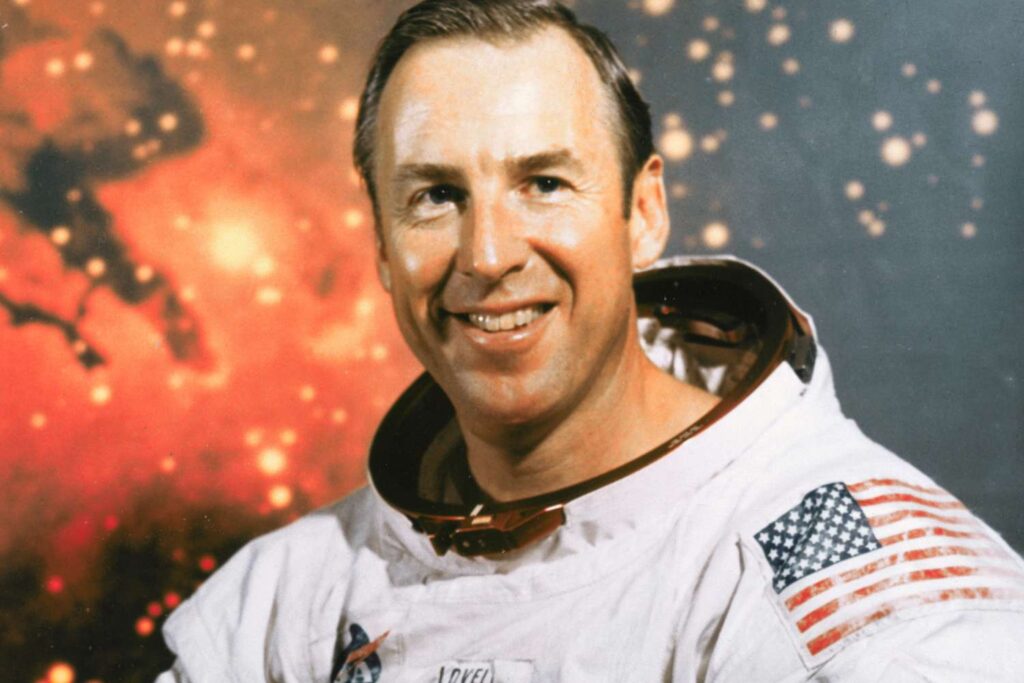NEED TO KNOW
Astronaut James Lovell Jr., known for serving as commander of the Apollo 13 mission, died Thursday, Aug. 7, in Lake Forest, Ill. He was 97.
On Friday, Aug. 8, his family confirmed his death in a statement to NASA. The Lovell family paid tribute to the late patriarch, honoring his legacy, and his historic professional accomplishments, which included his “legendary leadership in pioneering human space flight.”
“But, to all of us, he was Dad, Granddad, and the Leader of our family. Most importantly, he was our Hero,” the statement read, per NBC News. “We will miss his unshakeable optimism, his sense of humor, and the way he made each of us feel we could do the impossible. He was truly one of a kind.”
Lovell was a veteran of four spaceflights: Gemini VII, Gemini XII, Apollo 8 and Apollo 13, the latter of which he was best known for and inspired the 1995 film, Apollo 13, starring Tom Hanks.
Bob Levey/WireImage
The actor, who portrayed Lovell in the Ron Howard film, posted a statement on Instagram. “There are people who dare, who dream, and who lead others to the places we would not go on our own,” Hanks, 69, wrote. “Jim Lovell, who for a long while had gone farther into space and for longer than any other person of our planet, was that kind of guy.”
Hanks continued, “His many voyages around Earth and on to so-very-close to the moon were not made for riches or celebrity, but because such challenges as those are what fuels the course of being alive – and who better than Jim Lovell to make those voyages. On this night of a full Moon, he passes on – to the heavens, to the cosmos, to the stars. God speed you, on this next voyage, Jim Lovell.”
Bettmann/Getty
Lovell was born in Cleveland on March 25, 1928, and moved to Milwaukee with his mother during his adolescence. The teenage Lovell, who was already interested in space, attended the University of Wisconsin-Madison for two years before transferring to the Naval Academy and graduating in 1952. Three hours after his graduation, he married his high school sweetheart, Marilyn Gerlach, who passed away in 2023, per The Washington Post.
He served as a Navy test pilot, and by September 1962, he was selected to be a NASA astronaut. He was placed in a group of trainees for the Gemini and Apollo flights. They were known as the “Next Nine,” and the group also included Neil Armstrong, Charles “Pete” Conrad and John Young.
On Dec. 4, 1965, Lovell’s Gemini VII went on a 14-day mission with Frank Borman. The following year, on Nov. 11, 1966, he and Edwin “Buzz” Aldrin participated in the Gemini series’ final flight, Gemini XII.
Two years later, he, Borman and William A. Anders were the first crew to leave Earth’s orbit and travel to the Moon. Their Apollo 8 mission circled the moon after the Dec. 21, 1968, takeoff.
AP Photo
In 1970, Lovell embarked on his most famous mission, Apollo 13. He, John “Jack” Swigert and Fred Haise launched into space in April that year, intending to become NASA’s third moon landing.
However, less than an hour into their mission, at the 55 hours, 55 minutes and 4 seconds-mark, one of the spacecraft’s oxygen tanks exploded and another failed. As Lovell and his crew members discovered the disaster 240,000 miles from Earth, they contacted NASA based in Houston, and he uttered the enduring, famous phrase: “Houston, we’ve had a problem.”
The following three days, NASA went on to execute a historic rescue as the astronauts faced shortages of water and electrical power, and extremely high levels of carbon dioxide. Three days later, with a total of six days in space, the Apollo 13 crew safely splashed down in the Pacific Ocean.
Lovell was celebrated for his leadership throughout the flight, which would later be referred as a “successful failure,” due to the NASA engineers and astronauts’ inventiveness during the turmoil.
“As commander of the Apollo 13 mission, his calm strength under pressure helped return the crew safely to Earth and demonstrated the quick thinking and innovation that informed future NASA missions,” Acting NASA Administrator Sean Duffy said in a tribute statement.
HUM Images/Universal Images Group/Getty
Lovell spent 715 hours in orbit before he retired from the agency in 1973. Three years prior, President Richard Nixon awarded him the Presidential Medal of Freedom. Then, in 1995, President Bill Clinton awarded him the Congressional Space Medal of Honor.
In 1975, he was named president and chief executive of the Bay-Houston Towing Company. He later became a senior executive at telecommunications companies and owned consulting firm, Lovell Communications.
J.B. Spector/Museum of Science and Industry, Chicago/Getty
Due to Apollo 13 serving as his final mission, Lovell never walked on the moon. He told the Milwaukee Journal Sentinel in 2020, “I realized that although I didn’t land on the moon and was disappointed — it was a triumph in a different direction, meaning getting people back from a certain catastrophe.”
That same year, he said on the Today show, how “very fortunate” he felt about his life, per The New York Times: “I think that I’ve lived a life that — if I had a chance to live all over again, even though if I knew what the consequences would be and the chance of coming back, you know, were not unknown at the time … I would do it.”
Lovell is survived by his four children; James III, Jeffrey, Barbara and Susan; 11 grandchildren; and nine great-grandchildren. His wife Marilyn Lovell died in 2023.

